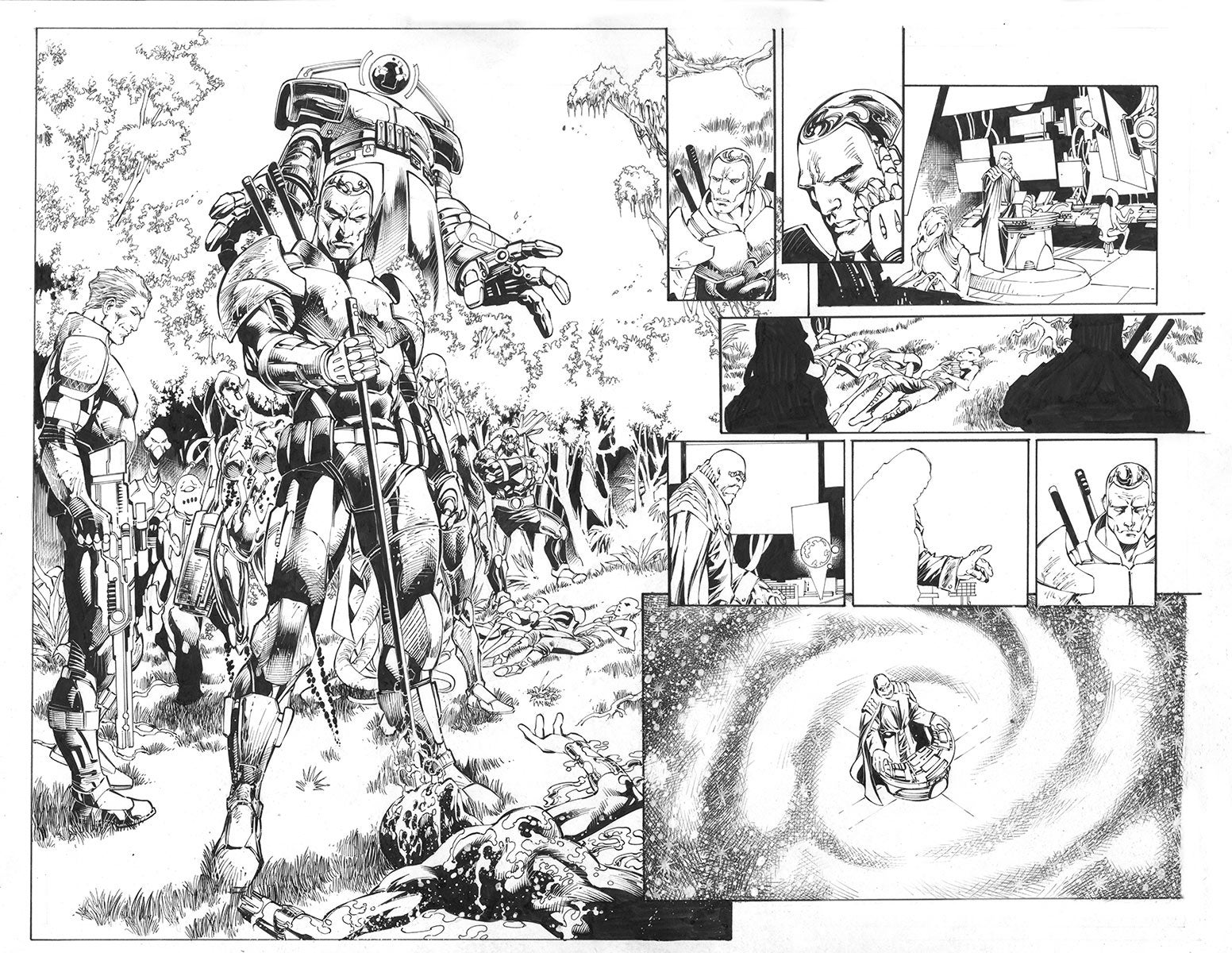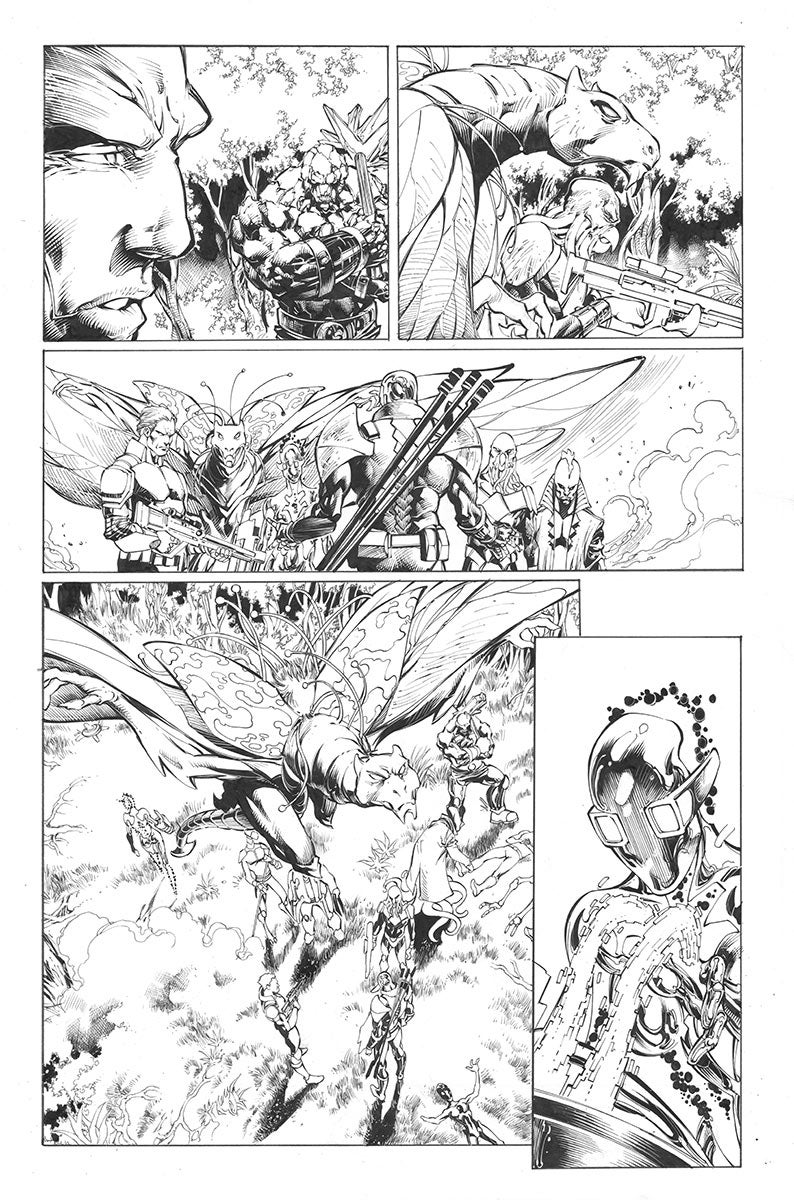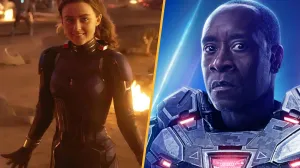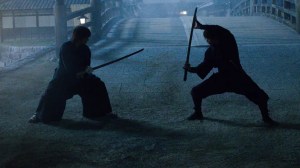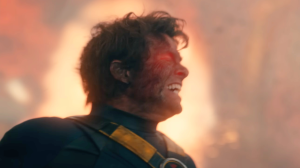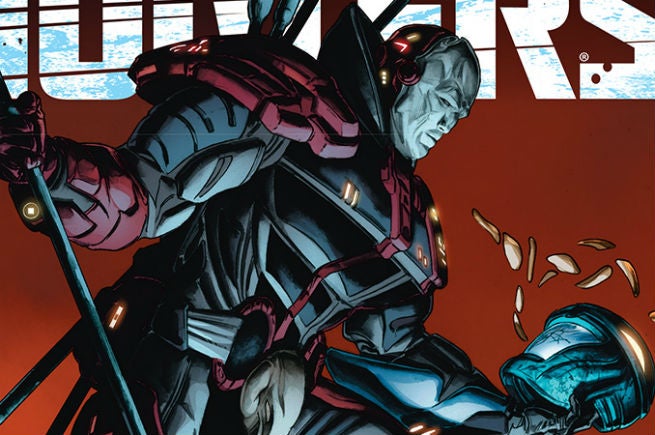
Videos by ComicBook.com
He’s taken it all in stride and his most recent big-picture move — Armor Hunters, an X-O Manowar event that has tie-in miniseries and implications throughout the Valiant Universe — sees its third issue (of four) hit this week.
Venditti joined ComicBook.com to talk about the project and his plans for the future of X-O Manowar and the Valiant Universe — plans which have apparently been in place for quite a while now.
Armor Hunters, I think, feels to me like the biggest event that Valiant has done since the relaunch. The tie-ins might help with that. How closely are you communicating with the other writers on those?
It’s a pretty coordinated effort on all of our parts. I don’t want to make it sound like I’m directing them in their own books or anything. We all go over each others’ scripts — we just had a writers’ retreat to talk some things through just to make sure we’re all on the same page.
We stay in pretty close contact with each other, coordinating things and making sure all the pieces are where they need to be for the crossover and that goes both ways, you know? Me having to put some pieces where a tie-in will need them or a tie-in having to put something in place where I’m going to need it. Really, it’s just a lot of coordination and staying on the same page, not just with the other writers but also with the editors.
It’s been pretty good so far. Well, not even so far. We’re done, I would say, with the writing part for the most part at this point and it all went pretty smoothly.
Was there anything that surprised you during this process?
IT was certainly very fluid in the beginning. We had a game plan of what we wanted to do and where we wanted to go. But new things came up as we were trying to bring in other tie-ins and get all the pieces in place and you would have new ideas and sort of build out on that existing framework.
So yeah, we didn’t start from scratch but we definitely wanted to keep it open to let things develop organically because that’s when the best stuff happens.
In the mission statement from the beginning was always to build on the core concept of the original series — to expand on that mythology, update it, modernize it, add to it where needed and that was the plan from Day One. Some of the stuff that you’re seeing now — and yeah, there is a lot of new mythology that we’ve added, particularly in the revelations about the armor that you see in Armor Hunters #2 and the Hunters and all this kind of stuff — that’s all new mythology that we’ve built out. A lot of those things have been in place ever since the pitch phase.
The nice thing about working on a monthly series is that you have that space to always be developing things. I’ve done miniseries before and when it’s done, the story’s over. With a monthly series that’s ongoing, that’s what the great thing about it: there’s always a place for new creativity, to do new things and the story never ends.
I have been developing new ideas all along and Valiant has as well. Warren and me have a really great relationship I think and we bounce things off each other all the time. He’ll send me something in a text or I’ll send him something in a text and before you know it, you’re building a whole new storyline.
There are still a lot of things from my original pitch that haven’t even been touched upon so it’s one of those situations where we feel like we’ve got plenty of creative ideas still to come.
As much as we resolve with Armor Hunters I think it will be apparent particularly with the Aftermath issue that we put out in October that for as many doors as we’ve closed, we’ve opened up just as many more.
With X-O, it feels like you have a clear voice in the book but I don’t think of it as “your” X-O. It feels very definitive and generally applicable, rather than the stylized thing of “Well, this is Mark Waid’s Daredevil” or “Gail SImone’s Batgirl.” Was that an intentional choice or is that just your voice?
My focus as a writer is never to call attention to myself but always to have attention be on the story. I don’t do a lot of meta stuff in my story, I don’t turn around and have the characters address the audience or a lot of those things because I want the audience to get completely lost in the story and anything I do that calls attention to the fact that it’s a story takes them out of that, breaks that fourth wall. So I don’t know if what you’re talking about is just a natural extension of the way I write or not but it is a paramount concern for me at all times to have the story take precedence over everything else.
Part of that too might come from the fact that every project I take on, I try to make it something totally different and unique than anything I’ve done in the past. For example, I went from The Surrogates which was cyberpunk sci-fi to The Homeland Directive which is a modern-day political/medical thriller to adapting the Percy Jackson and the Olympians novels which is middle-grade fantasy. Now X-O Manowar which is very different than Green Lantern which is very different than Flash.
So I’m always trying to do something different with every project and that’s a conscious decision on two levels: One, I want to challenge myself as a writer and trying new things and getting outside my comfort zone and maybe I won’t always succeed but at least I will have challenged myself and hopefully grown and gotten better as a writer. Additionally, I didn’t ever want to be the guy who was, “Oh he writes cyberpunk science fiction.” After The Surrogates and the success that I had with that, there were people who were certainly advising me, “Okay, you need to go out and do your next cyberpunk science fiction story and become known for that and brand yourself.” And I just rejected that. I’m not saying that’s not a valid way to manage somebody’s career — there’s certainly some writers who have done that but for me, I didn’t want to be somebody who could only do one thing.
So you’ve never seen me write a story like X-O Manowar before so it would be difficult for me to use a particular tactic or a particular technique in X-O Manowar that I used in Surrogates. They’re just very different formats, very different genres, very different in just about every way.

Gosh, I don’t think so. I think I keep all that stuff pretty separate. It’s easy to do when the books are so different; X-O Manowar may have a cosmic aspect to it but a Sixth-Century Visigoth transported to the modern day is in no way similar to a test pilot from coastal California who’s now a cop in space. They’re very different stories and so it’s easy to keep them separate. I wouldn’t want to do anything that was too similar whether it was at the same company or two different companies.
I think if there’s one thing that you can point at in everything I’ve done from creator-owned to Valiant to DC, it would be in the way that I approach antagonists in those stories. If it’s somebody like Steeplejack in The Surrogates or somebody like Relic in Green Lantern or now we have the Armor Hunters, they’re always sympathetic and relatable to the reader in some way so that they aren’t mustache-twirlers and you can see what their motives are and in some ways you can see why they’re doing what they’re doing even if you disagree with how they’re going about doing it. I think maybe that’s something that you can track through just about everything that I’ve written.
And they’ve played with that same idea using X-O as the antagonist at the start of Unity.
Yeah, I mean that’s all very intentional. That was all baked into the concept from the beginning and one of the things about X-O that always interested me was using the character to sort of look at heroism and how we understand it and how we define it and how that changes over time. An example I use is something like Braveheart. We watch that movie and we get to the part where Braveheart has sent his enemy his cousin’s head in a basket as a message — and he presumably decapitated this guy just to send it to the King as a message — and as an audience we’re rooting for that: “Yeah, Braveheart! Way to go!” You know? If that were to happen in a movie that was set in the modern day and it was a Marine or something like that who did that to somebody, we would wonder why that guy wasn’t being tried for war crimes.
So how does our concept of heroism change over time? Aric — even through the Unity arc and coming back to Earth and setting up shop in Romania and planting his flag and taking over the country would have been an unparalleled hero to his own people in his own time. But in the modern day when he did that, the world viewed him as a villain so that dichotomy is part of what attracted me from the beginning.
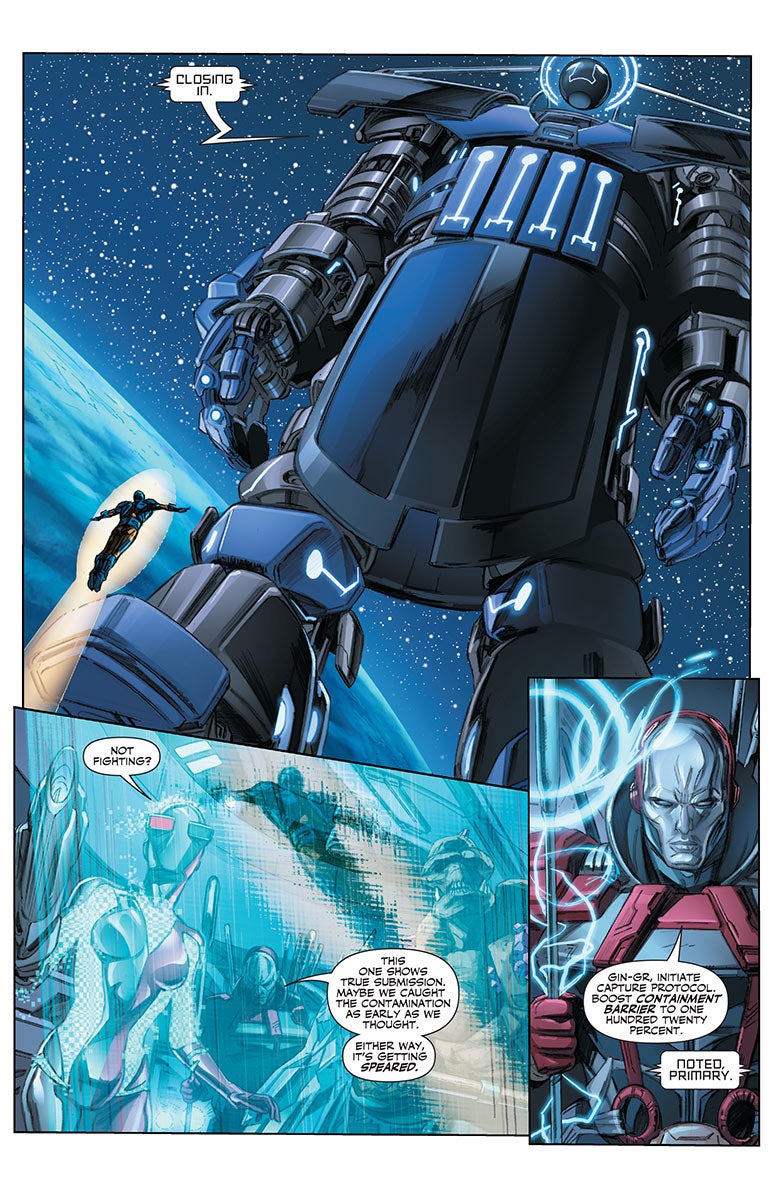
I would say we are pretty much done with all the conversation at this point. I’m going through the lettering file right now for #3 and it only gets bigger and it only climbs in terms of the intensity and the threat level. I’m very excited about where it goes and how we resolve everything and what the climax is.
This thing was so much fun to write and it’s so much fun to work with the art team and with Valiant and all the other writers doing the tie-ins. It’s one of those things that career-wise I think I’ll always look back on and think of very fondly.
For me being a guy who writes these words on a white Word doc and then gets an e-mail that’s Doug Braithwaite’s pencils colored by Laura Martin — [laughs] — you know what I mean? To say it elevates things is a drastic understatement.
Is there anything you can say about what comes up after Armor Hunters?
Yeah — I said earlier that as many doors as we closed, we open just as many new ones. That’s not just for X-O, that’s for the whole Valiant Universe. If you look at the sheer number of concepts and characters that have been introduced in this storyline and in its tie-ins you can see how much the Valiant Universe has expanded. Whether it’s something as seismic as Mexico City no longer existing in the Valiant Universe or what the implications are for Armor Hunters, the characters and the mythology that we’ve built out for the larger universe on a cosmic level, I think you can see that there’s plenty of directions things can go in. We do have some very big storylines coming up. It’s always challenging on any monthly book because every month you want to try to always be on the upslope and always be getting bigger and grander even as you’re resolving one story and starting a new one. We’re going to take our shots and hopefully people will stay along for the ride.
X-O was your irst ongoing monthly. How have you been coping with doing sometimes as many as four at a time?
Well, first of all when I first started X-O I was still working as an employee at Top Shelf Productions; I still had a full-time day job. So I don’t have that anymore. I don’t want to say that I’m doing four ongoing series, that’s not the case. Armor Hunters is a four-issue mini, that’s very different and I also co-write The Flash with Van Jensen so he and I are sharing that workload. So really it’s like two and a half books a month plus a miniseries thrown in. It’s definitely a lot more work than i used to have which I feel very fortunate about — but I think I’ve been very careful about only taking on new projects…I didn’t go from X-O Manowar to four projects overnight. I started with X-O Manowar and after I did that for a while I added in Green Lantern. Then after I did that for almost a year I added The Flash. I add things one at a time and I make sure I can handle the workload that I have currently before I add anything to it and that’s how I keep myself on schedule and don’t blow any deadlines and hopefully keep the quality of the work up as well.

